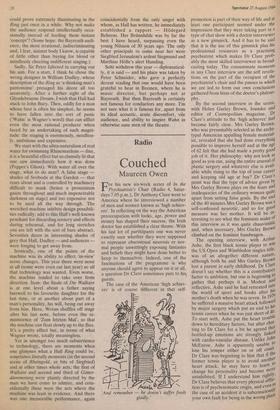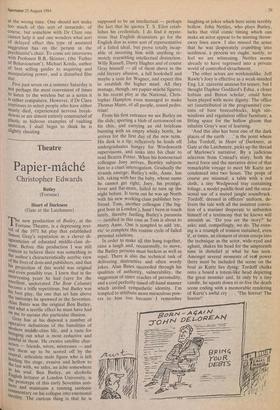Radio
Couched
Maureen Owen
or his new six-week series of In the 1' Psychiatrists's Chair (Radio 4, Satur- days 7.05 p.m.), Dr Anthony Clare went to America where he interviewed a number of men and women known as 'high achiev- ers'. In reflecting on the way the American preoccupation with looks, age, power and money has shaped their success, the Irish doctor has established a clear theme. With his last lot of participants one was never exactly sure whether they were supposed to represent obsessional neurosis or nor- mal people unwittingly exposing fantasies and beliefs they might have done better to keep to themselves. Indeed, one of the fascinations of the programme is why anyone should agree to appear on it at all, a question Dr Clare sometimes puts to his1 guests.
The case of the American 'high achiev- ers' is of course different in that self-
'And remember — he doesn't suffer fools gladly.'
promotion is part of their way of life and at least one participant seemed under the impression that they were taking part in a type of chat show with a doctor interviewer as a new gimmick. And it has to be said that it is the use of this gimmick plus his professional resources as a practising psychiatrist which makes Dr Clare prob- ably the most skilled interviewer in broad- casting today. The consummate moments in any Clare interview are the self revela- tions on the part of the occupant of the psychiatrist's chair and the pauses in which we are led to form our own conclusions gathered from hints of the doctor's philoso- phy. By the second interview in the series, with Helen Gurley Brown, founder and editor of Cosmopolitan magazine, Dr Clare's attitude to the 'high achiever' had become fairly clear. Mrs Gurley Brown, who was presumably selected as the arche- typal American appalling female material- ist, revealed that she had done everything possible to improve herself and at the age of 62 felt that she had made a pretty good job of it. Her philosophy: why not look as good as you can, using the entire arsenal of plastic surgery and whatever else is avail- able while rising to the top of your career and keeping old age at bay? Dr Clare's point was that the type of advice given by Mrs Gurley Brown plays on the fears and inadequacies of the ordinary woman quite apart from setting false goals. By the end of the 40 minutes Mrs Gurley Brown was a self-confessed neurotic, and so for good measure was her mother. It will be in- teresting to see what the feminists make of this interview as it was quite chauvinistic and, when necessary, Mrs Gurley Brown climbed on the feminist bandwagon. The opening interview, with Arthur Ashe, the first black tennis player to will the US Open and Wimbledon singles title, was of an altogether different nature, although both he and Mrs Gurley Brown lost a parent in early childhood. Dr Clare doesn't say whether this is a contributory factor to ambition, but one is beginning to gather that perhaps it is. Modest and reflective, Ashe said he had retreated into the world of sport and books after his mother's death when he was seven. In 1979 he suffered a massive heart attack followed by major surgery which put an end to his tennis career when he was just short of 40. To start with, Ashe put the heart trouble down to hereditary factors, but after chat" ting to Dr Clare for a bit he agreed that bottled-up emotions are strongly linked with cardio-vascular disease. Unlike Jon" McEnroe, Ashe is apparently unable to lose his temper either on or off court. Dr Clare was beginning to hint that if the former tennis player is to avoid another heart attack, he may have to learn to change his personality and become more uninhibited. If I understand him rightly, Dr Clare believes that every physical afflic.: tion is of psychosomatic origin, and even l" the case of an accident it is subconsciously your own fault for being in the wrong place
at the wrong time. One should not make too much of this sort of innuendo, of course, but somehow with Dr Clare one cannot help it and one wonders what sort of delayed effect this type of unstated suggestion has on the person in the psychiatrist's chair. To come are interviews with Professor B.R. Skinner, (the 'Father of Behaviourism'), Michael Korda, author of best selling guides to acquiring and manipulating power, and a disturbed film star.
Five past seven on a summer Saturday is not perhaps the most convenient of times to listen to the wireless but as a series it is rather compulsive. However, if Dr Clare continues to select people who have either nearly died, experienced nervous break- downs or are almost entirely constructed of plastic as hideous examples of vaulting ambition, I shall begin to think he is slightly cheating.







































 Previous page
Previous page